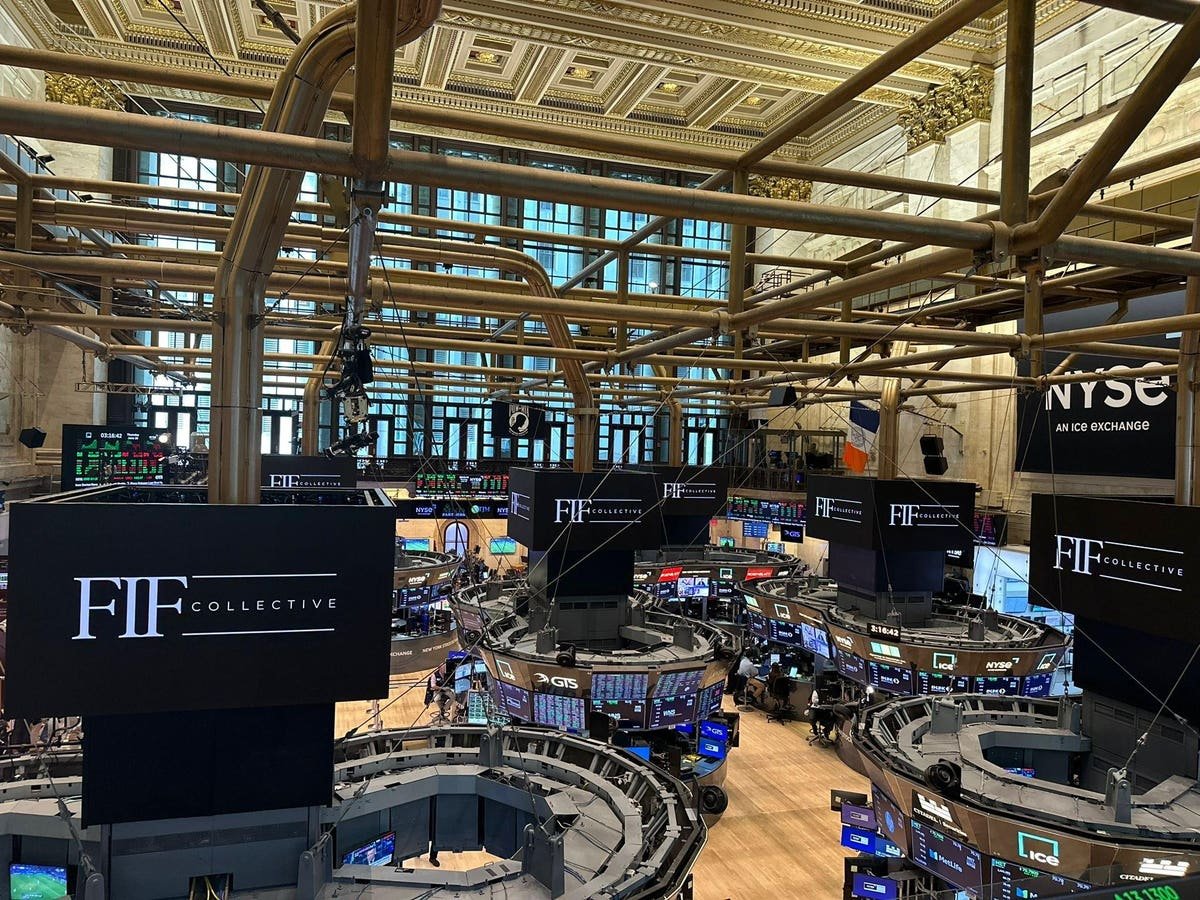FIF Collective marks one year and 1000 members at NYSE June 24th
Muriel Siebert, known as the ‘First Woman of Finance,’ was the first woman ever to own a seat on the New York Stock Exchange in 1967. She was a passionate advocate for gender equality and remembered as a woman who refused to take no for an answer. Known to have famously threatened the NYSE Chairman with the installation of a portable toilet on the trading floor if a women’s restroom was not granted, and her public appearances with her Chihuahua ‘Monster Girl,’ named in tribute to how neither one was intimidated by ‘the big dogs,’ she had an unyielding confidence and determination that cultivated a rare respectability for women of her era. So rare, she remained the only woman in a ratio of 1365:1 at the NYSE for over a decade.
FIF Collective
Fast forward 57 years later, and it seemed like the perfect fit for the ‘Female in Finance Collective (FIF), led by group CEO Meghan McKenna, to gather in the Muriel Siebel room at the NYSE on June 20th to celebrate its one-year birthday and surpassing its 1000 member milestone. The Collective, is described as ‘an invite-only, highly selective group of Founders, CEOs, CFOs, VPs of Finance, VC Partners, and leaders, with a mission to advance the profiles of women through board seats, job opportunities, networking, learning, and great parties around the world.’
McKenna, like Siebert, is described by many as a woman to whom it is impossible to say no. She is known for her brash humor, charming confidence, low tolerance for inequality, and unwavering belief that change is possible. She equates these attributes to her college basketball career and her humble upbringing in the Bronx as the daughter of a New York Police Officer. “I’ve always stayed true to what I know is right and stood up for others around me,” she says, “that hasn’t always been an easy path to take. I have worked in teams where I was told I was ‘tough to manage,’ just for being honest. But I stay true to my values. We owe that to ourselves and other women.”
McKenna, who founded FIF shortly before starting a new role as a Managing Director at Stifel Bank, says that although the idea had floated in her head for many years, it was the pause between roles that gave her the headspace to make it happen. Yet she was not ready to exit a career she loves and was looking for a home to combine her experience, talent, and FIF, which she found at Stifel. “This is an industry that can be more performative than meaningful when it comes to gender equity, but Stifel has walked the walk when it comes to supporting women,” she says. “My network is my net worth and the team at Stifel really understand and support that. They see the broad industry value FIF creates for everyone.”
FIF founding team, From left: Christian Brosnan, Amy Kux, Jean Brosnan, Meghan McKenna, Angie … [+]
She says FIF was born after two decades of seeing countless gaps and lost opportunities for women and bottom-line impacts on business. “Women are not progressing at a rate that makes sense for their capabilities and industry needs,” she says. The effect of this is backed by data, such as the 2022 World Economic Forum’s ‘Global Gender Gap Report,’ which revealed females in finance remain one of the most untapped business resources. The share of women in global C-suite roles in the financial services industry worldwide reached 18.4 percent in 2023, and predictions from a recent Statista Study estimate a growth to 21.8 percent by 2031.
For McKenna and the team at FIF, the idea of waiting another near-decade for a mere 3.4 percentage point increase in female representation is not a reality they are willing to accept. Yet the trillion dollar question remains, how can we improve this? While there is no magic bullet solution, they believe the right place to start, is to look to each other and initiate a collective effort for change.
The cost equals the commitment
FIF is not alone in this mission. There has been a widespread proliferation of communities and programs promising to empower women and accelerate their professional success, an approach many consider crucial for women. Yet unlike many of these networks, which incur sizable membership fees and restrict their events to women, FIF takes a different approach. McKenna says she wanted a ‘personally free network for qualifying women. “This is a network of decision-makers and investors who bring merit she says, “I want them to bring their passion to this mission at no cost but their commitment to cultivate change.”
A strategy for sponsors and allies
Instead, the monetization will come via paid talent matching and a sponsorship program for events and seminars open to men and women. This strategy appears to work well for McKenna, who has fostered a growing partner ecosystem of over 30 sponsors in year one, including names like Deloitte, Amazon, KPMG, Samsung Next, Netsuite, Davis Polk, and Ramp, hosted 12 events across the cities of New York, San Francisco, Boston and Washington DC.
FIF sponsors gathering at NYSE to mark 1 year From left: Iris Chen- Cross Country Consulting, … [+]
Ken Egan, Partner at Cross Country Consulting, shares that he finds this approach effective as it focuses on bottom-line impacts and brings others along on the journey. In doing so, there is an organic allyship, something that critics of female-only networks often highlight as a missing link. “I have attended events and seen the value FIF brings,” he says, “This is a tough industry for women, and businesses in knowing how best to support but often showing up is half the battle. FIF forces people out of their comfort zones in a healthy way and creates a conscious and intentional level of connection.”
The burden of proof over potential
For venture capitalist Marissa Hodgdon, CEO of Sidelines.Vc, the nature of that intent is critical. She shares that a key challenge women in the finance industry face is the burden of ‘proof over potential.’ The ‘you know what you know’ effect that has worked very favorably for white males, who continue to receive more than 90% of annual VC dollars. She believes they will continue to do so unless women create a new wave of intentional change. Hodgdon, who is partnering with FIF to bring investment and advisory opportunities to the Collective, says, ‘we need to be targeted in putting opportunities for advisory roles and investment in front of women. FIF is the perfect forum for us to do this. A high caliber network of well-informed women creating change for themselves.”
The power of possibility
Much of the focus on financial leadership centers on business models—revenues, costs, niches, and leverage. However, what women often need are new mental models. Gaingels CEO Jennifer Jeronimo sees her firm’s partnership with FIF as a catalyst to create a new sense of possibility. Addressing the audience at the NYSE event, she gave the analogy of Roger Bannister, who shocked the world with the power of the possibility by breaking the record for the four-minute mile, once deemed hopelessly impossible, yet achieved by over 1000 runners since. Jeronimo wants to bring that same power of possibility to women in the VC realm and diversify the face of an industry that often looks and sounds the same.
FIF Collective CEO Meghan McKenna joins Judy Shaw Floor Talk at NYSE June 20th 2024 to celebrate 1 … [+]
What’s next for FIF?
Fractional CFO and advisor Amy Kux who is a founding member of FIF, shares that her main reason for joining this team was her belief in the importance of females supporting each other not through words but action. ‘I have been part of many networks over the course of my career,’’ she shares, ‘’but FIF is one of the only communities that promotes helping one another as its mission, and we cannot waver on that.”
This is an important factor for McKenna and the team at FIF as they look to the future and consider opportunities to grow the collective across new cities in the USA and international . McKenna says they will not put scale above substance and instead stay focused on their core values and strategic objectives by continuing to listen to one another. “We are a group of women who have created this as a labor of love and bootstrapped our way to now. We are not salaried, we do this voluntarily and most of us have full time jobs. Of course we want to grow and monetize to better resource and reinvest, but for now our core focus is not on headline growth but ensuring we maintain a high caliber community. That is what makes FIF so impactful.”
Muriel Siebert once said, “you create opportunities by performing not complaining.” For the women at FIF Collective this is a mantra for the next stage, as they look to build a future for females in finance by proving the power of connection, and collectively challenging the status quo.




